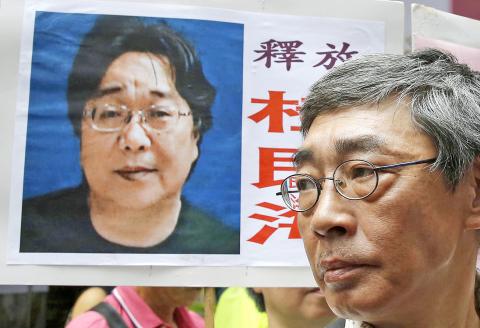China has sentenced Swedish book publisher Gui Minhai (桂民海) to 10 years in prison on charges of illegally providing intelligence abroad and claimed him as a citizen, prompting Stockholm to call for his release in a case that has rattled diplomatic relations.
Gui, one of five Hong Kong-based booksellers known for publishing salacious titles about Chinese political leaders, was snatched by Chinese authorities while on a train to Beijing in February 2018, the second time he disappeared into Chinese custody.
The court in the eastern city of Ningbo said Chinese-born Gui was convicted to 10 years in prison on Monday and claimed that he voluntarily reinstated his Chinese citizenship in 2018.

Photo: AP
Since China does not recognize dual citizenship, “China, according to law, only recognizes him as a Chinese citizen,” Chinese Ministry of Foreign Affairs spokesman Zhao Lijian (趙立堅) said yesterday.
However, Swedish Minister of Foreign Affairs Ann Linde said in a statement to reporters that Stockholm continues to call for Gui’s release and “demand access to our citizen to give him the consular support he has the right to.”
The Swedish foreign ministry said that citizenship can “only be renounced after an examination and a decision by the Swedish Migration Agency.”
“Gui Minhai is a Swedish citizen,” it said, adding that it “notes” the Chinese claim.
Gui first vanished in 2015 while on holiday in Thailand and eventually surfaced at an undisclosed location in China, confessing to involvement in a fatal traffic accident and smuggling illegal books.
He served two years in prison, but three months after his October 2017 release, he was again arrested on a train to Beijing while traveling with Swedish diplomats.
His supporters and family have claimed his detention is part of a political repression campaign orchestrated by Chinese authorities.
The Ningbo court also sentenced Gui to five years of “deprivation of political rights” — which in practice means he cannot lead state-owned enterprises or hold positions in state organs.
A video released by China three weeks after Gui’s disappearance showed him purportedly confessing wrongdoing and blaming Sweden for “sensationalizing” his case and “instigating” law-breaking behavior.
Gui’s friend, dissident poet Bei Ling (貝嶺), said at the time that Gui’s confession was likely made under coercion.
The Ningbo court’s decision to highlight Gui’s citizenship was “obviously politically motivated” and intended to “stop the Swedish government from offering any support to Gui Minhai,” Amnesty International researcher Patrick Poon told reporters.

LONG FLIGHT: The jets would be flown by US pilots, with Taiwanese copilots in the two-seat F-16D variant to help familiarize them with the aircraft, the source said The US is expected to fly 10 Lockheed Martin F-16C/D Block 70/72 jets to Taiwan over the coming months to fulfill a long-awaited order of 66 aircraft, a defense official said yesterday. Word that the first batch of the jets would be delivered soon was welcome news to Taiwan, which has become concerned about delays in the delivery of US arms amid rising military tensions with China. Speaking on condition of anonymity, the official said the initial tranche of the nation’s F-16s are rolling off assembly lines in the US and would be flown under their own power to Taiwan by way

‘OF COURSE A COUNTRY’: The president outlined that Taiwan has all the necessary features of a nation, including citizens, land, government and sovereignty President William Lai (賴清德) discussed the meaning of “nation” during a speech in New Taipei City last night, emphasizing that Taiwan is a country as he condemned China’s misinterpretation of UN Resolution 2758. The speech was the first in a series of 10 that Lai is scheduled to give across Taiwan. It is the responsibility of Taiwanese citizens to stand united to defend their national sovereignty, democracy, liberty, way of life and the future of the next generation, Lai said. This is the most important legacy the people of this era could pass on to future generations, he said. Lai went on to discuss

MISSION: The Indo-Pacific region is ‘the priority theater,’ where the task of deterrence extends across the entire region, including Taiwan, the US Pacific Fleet commander said The US Navy’s “mission of deterrence” in the Indo-Pacific theater applies to Taiwan, Pacific Fleet Commander Admiral Stephen Koehler told the South China Sea Conference on Tuesday. The conference, organized by the Center for Strategic and International Studies (CSIS), is an international platform for senior officials and experts from countries with security interests in the region. “The Pacific Fleet’s mission is to deter aggression across the Western Pacific, together with our allies and partners, and to prevail in combat if necessary, Koehler said in the event’s keynote speech. “That mission of deterrence applies regionwide — including the South China Sea and Taiwan,” he

UNPRECEDENTED: In addition to the approved recall motions, cases such as Ma Wen-chun’s in Nantou are still under review, while others lack enough signatures The Central Election Commission (CEC) announced yesterday that a recall vote would take place on July 26, after it approved the first batch of recall motions targeting 24 Chinese Nationalist Party (KMT) lawmakers and Hsinchu Mayor Ann Kao (高虹安). Taiwan is in the midst of an unprecedented wave of mass recall campaigns, following a civil society push that echoed a call made by Democratic Progressive Party (DPP) caucus whip Ker Chien-ming (柯建銘) in January to initiate signature drives aimed at unseating KMT legislators. Under the Civil Servants Election and Recall Act (公職人員選舉罷免法), Taiwanese can initiate a recall of district-elected lawmakers by collecting